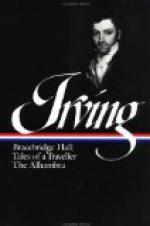The spells and love-charms, which are matters of sport to the other domestics, are serious concerns with this love-stricken damsel. She is continually trying her fortune in a variety of ways. I am told that she has absolutely fasted for six Wednesdays and three Fridays successively, having understood that it was a sovereign charm to ensure being married to one’s liking within the year. She carries about, also, a lock of her sweetheart’s hair, and a riband he once gave her, being a mode of producing constancy in her lover. She even went so far as to try her fortune by the moon, which has always had much to do with lovers’ dreams and fancies. For this purpose she went out in the night of the full moon, knelt on a stone in the meadow, and repeated the old traditional rhyme:
“All hail to thee, moon,
all hail to thee:
I pray thee, good moon, now
show to me
The youth who my future husband
shall be.”
[Illustration: The Love-Spell]
When she came back to the house, she was faint and pale, and went immediately to bed. The next morning she told the porter’s wife that she had seen some one close by the hedge in the meadow, which she was sure was young Tibbets; at any rate, she had dreamt of him all night; both of which, the old dame assured her, were most happy signs. It has since turned out that the person in the meadow was old Christy, the huntsman, who was walking his nightly rounds with the great staghound; so that Phoebe’s faith in the charm is completely shaken.
A BACHELOR’S CONFESSIONS.
I’ll have a private, pensive single life.
The Collier of Croydon.
[Illustration: Master Simon at the Window]
I was sitting in my room a morning or two since, reading, when some one tapped at the door, and Master Simon entered. He had an unusually fresh appearance; he had put on a bright green riding-coat, with a bunch of violets in the button-hole, and had the air of an old bachelor trying to rejuvenate himself. He had not, however, his usual briskness and vivacity, but loitered about the room with somewhat of absence of manner, humming the old song,—“Go, lovely rose, tell her that wastes her time and me;” and then, leaning against the window, and looking upon the landscape, he uttered a very audible sigh. As I had not been accustomed to see Master Simon in a pensive mood, I thought there might be some vexation preying on his mind, and I endeavoured to introduce a cheerful strain of conversation; but he was not in the vein to follow it up, and proposed that we should take a walk.
It was a beautiful morning, of that soft vernal temperature, that seems to thaw all the frost out of one’s blood, and to set all nature in a ferment. The very fishes felt its influence: the cautious trout ventured out of his dark hole to seek his mate, the roach and the dace rose up to the surface of the brook to bask in the sunshine, and the amorous frog piped from among the rushes. If ever an oyster can really fall in love, as has been said or sung, it must be on such a morning.




